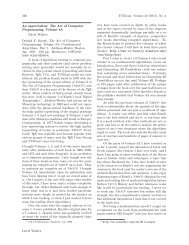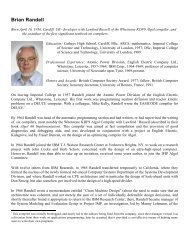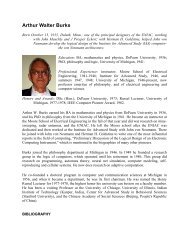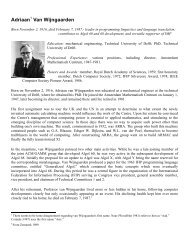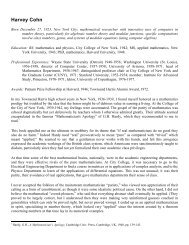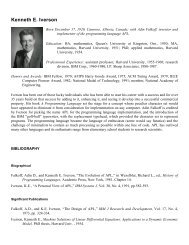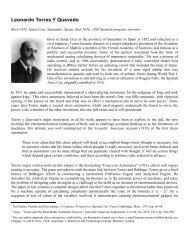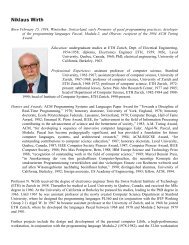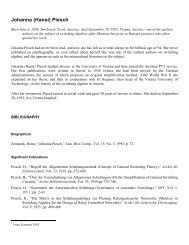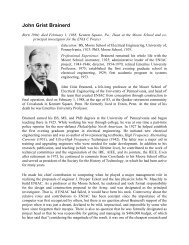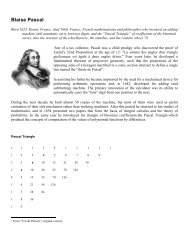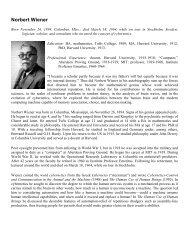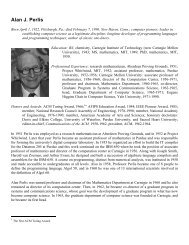Charles Babbage - Walden Family
Charles Babbage - Walden Family
Charles Babbage - Walden Family
You also want an ePaper? Increase the reach of your titles
YUMPU automatically turns print PDFs into web optimized ePapers that Google loves.
<strong>Babbage</strong> delighted in the thought of having a daily account of food consumed by zoo animals, or the<br />
“proportion of sexes amongst our poultry.” He proposed tables to calibrate the amount of wood (elm or oak) a<br />
man would saw in ten hours, or how much an ox or camel could plow or mow in a day.<br />
<strong>Babbage</strong>'s unflagging fascination with statistics occasionally overwhelmed him, as is seen in the animation of<br />
his Smithsonian proposal. “If I should be successful,” he wrote, “. . . it will thus call into action a permanent<br />
cause of advancement toward truth, continually leading to the more accurate determination of established fact,<br />
and to the discovery and measurement of new ones.”<br />
In Mechanics Magazine in 1857 <strong>Babbage</strong> published a “Table of the Relative Frequency of the Causes of<br />
Breaking of Plate Glass Windows,” detailing 464 breakages, of which “drunken men, women, or boys” were<br />
responsible for fourteen. <strong>Babbage</strong> thought the table would be “of value in many respects,” and might “induce<br />
others to furnish more extensive collections of similar and related facts.”<br />
<strong>Babbage</strong> faced significant problems with mechanical techniques. He had to invent the tools for his engine. His<br />
thought is so thoroughly modern that we wonder why he did not pursue electromechanical methods for his<br />
engines (especially after Faraday's 1831 discovery of induction and <strong>Babbage</strong>'s own electrical experiments). It is<br />
easy to forget how long ago <strong>Babbage</strong> worked.<br />
Even under the best of circumstances, the limitations of Newtonian physics might have prevented <strong>Babbage</strong> from<br />
completing any Analytical Engine. He did not know the advances of Maxwell (and could not know those of<br />
Boltmann, Gödel, and Heisenberg). Although he knew Fourier socially, <strong>Babbage</strong> did not seem to grasp the<br />
importance of his 1811 work on heat propagation, nor did he seem to know of Joule's efforts with heat and<br />
mechanical energy.<br />
The reversibility of attraction is a basic tenet of Newtonian mechanics. A body, or piece of information, may<br />
retrace its path and return to where it started. In <strong>Babbage</strong>'s design for the Analytical Engine, the discrete<br />
functions of mill (in which “all operations are performed”) and store (in which all numbers are originally<br />
placed, and, once computed, are returned) rely on this supposition of reversibility.<br />
In his 1824 essay on heat, Carnot formulated the first quantitative expression of irreversibility, by showing that<br />
a heat engine cannot convert all supplied heat energy into mechanical energy. Part of it is converted to useful<br />
work, but most is expelled into a low-temperature reservoir and wasted.<br />
From this observation came William Thomson's discovery of the Second Law of Thermodynamics in 1852, and<br />
Rudolf Clausius' discovery of entropy in 1865. In ideal reversible processes, entropy remains constant. But in<br />
others, as Eddington showed with his “arrow of time,” entropy only increases; thus, information cannot be<br />
shuttled between mill and store without leaking (some possibility of error), like faulty sacks of flour. <strong>Babbage</strong><br />
did not consider this problem, and it was perhaps his greatest obstacle to building the engine.<br />
It is easy to forget that <strong>Babbage</strong> was essentially a child of the Enlightenment, and that his epoch was much<br />
different from our own. He resided in an era of wood and coal, and the later era of steel and oil would not begin<br />
for perhaps a decade after his death.<br />
The Industrialist



